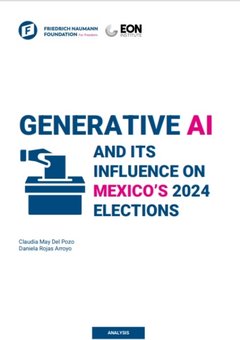Artificial Intelligence
AI and it's influence in Mexico's 2024 elections

Summary
Together with the EON Institute, we analyze the role of artificial intelligence in Mexico’s electoral process and examine how AI was used for disinformation generation, digital content manipulation, and its impact on trust in democracy.
The study explores the political context of the 2024 elections, in which Claudia Sheinbaum became Mexico’s first female president. It also documents specific cases where AI was used to influence the electoral debate, including deepfakes, manipulated audio, and social media bots. Key trends are identified, such as the limited use of generative AI for electoral manipulation, the role of technology in financial fraud, and its impact on gender-based political violence.
Despite advances in AI regulation, the report highlights that Mexican institutions still lack effective mechanisms to mitigate the risks associated with this technology in electoral processes. In this regard, public policy recommendations are presented, including the implementation of labels on AI-generated content, the strengthening of digital literacy, and cross-sector collaboration to counter the impact of electoral disinformation.
Why it's relevant?
The report addresses how generative artificial intelligence, particularly through deepfakes and automated content, influenced Mexico’s 2024 electoral process. It analyzes both the opportunities and threats AI presents for democracy, emphasizing the need for regulation and digital literacy to safeguard electoral integrity.
Why you should read it?
This document is essential for citizens, journalists, academics, politicians, and anyone interested in understanding how technology can manipulate public opinion and election outcomes. Additionally, it provides public policy recommendations to mitigate the risks associated with generative AI, fostering an informed discussion on AI governance in democratic contexts.

